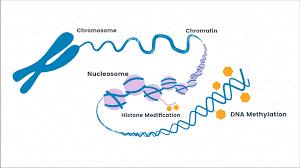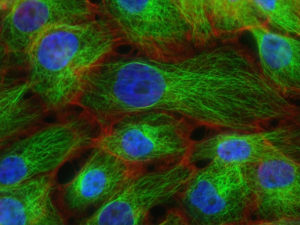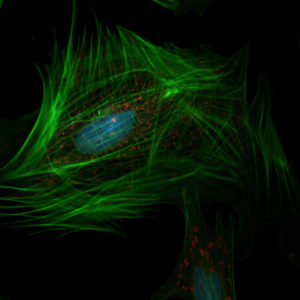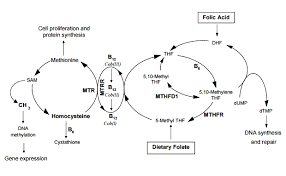If you’ve just discovered or heard about methylation and feel somewhat clueless (yep, been there myself) make sure you also have a read of a series of blogs I have written including the Should I be Freaking Out About my Genes? and Methylation, MTHFR – WTF?
In Should I be Freaking Out About my Genes? I discussed the difference between genes that are born dirty and genes that act dirty. The trouble is most of us these days probably have both.
It’s really important to understand at this point that when you have a folate deficiency it will effect ALL of your vitamin B groups. Also to be clear – for each person with a MTHFR mutation the presentation of symptoms will appear differently for everyone depending on which MTHFR mutation or gene mutation you have and how it affects you personally. According to MTHFR Gene Health the more obvious symptoms of vitamin B group imbalances include the following signs but remember – you may only experience some of these and only at times when your poorly methylating :
- Acne
- Anemia
- Anxiety
- Apathy
- Autism
- Bleeding or tender gums
- Burning feet or tender heals
- Burning or gritty eyes
- Blood clots
- blood or urine problems
- Cataracts
- Constipation
- Cracked lips
- Depression
- Diarrhea
- Dry skin
- Dull or oily hair
- Eczema or dermatitis
- Exhaustion after light exercise
- Eye pains
- Flaky skin
- Headaches
- Homocysteine levels (high or low)
- Imbalanced levels of homocysteine
- Homocystinuria due to poor methylation
- Homocystinuria due to methionine metabolism problems
- Inability to exercise
- Infrequent dream recall
- Insomnia
- Irritability
- Lack of energy
- Migraines
- Muscle cramps
- Muscle tremors
- Nausea
- Nervousness
- Neural tube defect
- Oversensitive mouth to heat or cold
- Poor concentration
- Poor appetite
- Pale skin
- Poor hair condition
- Poor memory
- Prematurely greying hair
- Prickly legs
- Rapid heartbeat
- Sensitivity to bright lights
- Sore tongue
- Split nails
- Stomach pains
- Teeth grinding
- Tender or sore muscles
- Tension
- Tingling hands
- Vomiting
- Water retention
MTHFR – What is it?
The first thing I’d like to say is EVERYONE has two copies of this MTHFR gene. Let’s be clear about that right from the start because this seems to cause confusion. Having the MTHFR gene is not the issue. In fact, the MTHFR gene is frigging awesome as far as genes go. Again, make sure you read Methylation, MTHFR – WTF?
The human body contains over 50 trillion cells, and each cell contains a complete set of instructions for making you. The instructions are encoded in your DNA. Short segments of DNA are called genes. Your DNA is the cookbook, your genes are the recipes.
Genes encode for specific proteins, and those proteins play a crucial role in the function of the body’s tissues and organs. Each of us is gifted with two copies of every gene, one copy of each inherited from each of our biological parents.
Humans have about 20-25,000 genes.
Your genes are part of what makes us the person you are. You are different from everyone alive now and everyone who has ever lived. Your genes also mean that you probably look a bit like other members of your family. For example, have you been told that you have ‘your mother’s eyes’ or ‘your grandmother’s nose’? Genes influence what we look like on the outside and how we work on the inside.
 Click here for a pop up box to refresh your memory on what’s the deal with genes, DNA and chromosomes and to also understand the difference between your genome and epigenome.
Click here for a pop up box to refresh your memory on what’s the deal with genes, DNA and chromosomes and to also understand the difference between your genome and epigenome.
Yes, I’m totally geeking out right now! But if you’ve had unresolved health issues or if you’ve been told you keep miscarrying and can’t maintain a pregnancy because of a chromosomal issue, then trust me understanding methylation at its root level, is incredibly empowering. So have a read of the pop-up box and get empowered.
Genes are your body’s blueprint.
A gene is a distinct section of DNA that provides the information that is copied into messenger RNA to build particular proteins, that then go on to build specific cell types. Genes contain the information our bodies need to make chemicals called proteins. Proteins form the structure of our bodies, as well playing an important role in the processes that keep us alive.
Your genes are housed in structures called chromosomes. Most cells hold 23 pairs of chromosomes, for a total of 46. The largest chromosome, chromosome 1, contains about 8000 genes. The smallest chromosome, chromosome 21, contains about 300 genes.
DNA: Genes are made of a chemical called DNA, which is short for ‘deoxyribonucleic acid’. The DNA molecule is a double helix: that is, two long, thin strands twisted around each other like a spiral staircase. The sides are sugar and phosphate molecules. The rungs are pairs of chemicals called ‘nitrogenous bases’, or ‘bases’ for short.
There are four types of base: adenine (A), thymine (T), guanine (G) and cytosine (C). These bases link in a very specific way: A always pairs with T, and C always pairs with G. Already you can see this where mistakes such as gene variations can and do, happen.
The DNA molecule has two important properties.
- It can make copies of itself. If you pull the two strands apart, each can be used to make the other one (and a new DNA molecule).
- It can carry information. The order of the bases along a strand is a code – a code for making proteins.
A gene is a length of DNA that codes for a specific protein. So, for example, one gene will code for the protein insulin, which is important role in helping your body to control the amount of sugar in your blood.
Genome
The entirety of an organism’s DNA—the DNA that codes for genes, and the extra (non-coding) DNA that is used to provide landmarks which regulate which genes are switched on or off.
Genome refers to an organism’s complete set genetic information responsible for the construction and proper functioning of the organism. All life forms have a genome—in humans, it consists of the 23 pairs of chromosomes containing DNA—that are unique to each organism. In contrast, for many viruses, the genome consists of only RNA.
DNA modifications that do not change the DNA sequence can affect gene activity. Chemical compounds that are added to single genes can regulate their activity; these modifications are known as epigenetic changes.
The epigenome comprises all of the chemical compounds that have been added to the entirety of one’s DNA (genome) as a way to regulate the activity (expression) of all the genes within the genome.
The chemical compounds of the epigenome are not part of the DNA sequence, but are on or attached to DNA (“epi“- means above in Greek). Epigenetic modifications remain as cells divide and, in some cases, can be inherited through the generations. Environmental influences, such as a person’s diet and exposure to pollutants, can also impact the epigenome.
A SNP (pronounced “snip”), short for single-nucleotide polymorphism is the most common type of genetic variation among people.
What is the MTHFR gene, exactly?
Among those 20-25,000 genes, is one called MTHFR (methylenetetrahydrofolate reductase). Most people have two copies of it and this gene is critical to producing the MTHFR enzyme which makes folate metabolism possible. In order words, it helps the body process folate, which is also known as vitamin B9.
The methylation cycle is important because it takes the nutrients from our food (and supplements) to make the energy our bodies need to work properly. I often refer to it as the “B vitamin Cycle” because this is where the B vitamins (B1, B2, B3, B6, B9, B12) get used in our bodies and why B vitamins are so important for our health.
Once through the methylation (B vitamin) cycle, our bodies use methyl-groups to make healthy cells and neurotransmitters (for mood), as well as for removing toxins (in the liver), fighting infections and protecting us from oxidative stress. I discuss What is Methylation? and why it’s important in Methylation, MTHFR – WTF? blog. I urge you to print this series of blogs and sit with a cup of tea and wrap your head around methylation because understanding it – can truly transform most health challenges.
Back to our gene – MTHFR is key to our body’s ability to produce an important enzyme called methylenetetrahydrofolate reductase. MTHFR is the abbreviation for the enzyme. The MTHFR enzyme is responsible for the proper activation and utilisation of folate (vitamin B9) or synthetic folic acid that we derive from supplements or fortified food. When we eat foods that contain folate (vitamin B9), MTHFR converts it into methyl-folate, folate’s active form. This process is super important because methyl-folate plays a role in just about everything our body does and this conversion – is step one of the methylation processes.
What does Methylation govern?
Methyl groups:
- Provides us with energy
- Turns the stress (fight-or-flight) response on or off
- Control the production of and recycling of glutathione — the body’s master antioxidant
- Co-ordinate the detoxification of fats, chemicals, and heavy metals
- Process hormones
- Create the inflammatory response
- Reduce histamine
- Repair of cells damaged by free radicals repairs cells membranes
- Repair DNA and RNA
- Turns genes on and off
- Builds immune cells
- Coordinate the immune response, controlling T-cell production, fighting infections, and viruses and regulating the immune response
- Co-ordinate myelination of nerves
- Coordinates neurotransmitters and the balancing of brain chemistry to prevent depression, anxiety, and insomnia
Methylation also allows the body to make a number of other important molecules, including:
- Melatonin, which helps with sleep
- Serotonin, which regulates mood, appetite and more
- Norepinephrine, which is involved in arousal and motivation
- Glutathione, often called the body’s “master antioxidant” that fights free radicals
- Coenzyme Q10, an antioxidant involved in energy production and healthy aging
- Nitric oxide, which facilitates vacillation of blood vessels and circulation
- L-carnitine, an amino acid that supports metabolic processes and cellular energy
- Cysteine, an amino acid that helps make protein and form collagen in the body
- Creatine, needed for skeletal and muscle function
- Taurine, an amino acid that supports the heart, nerves and brain
MTHFR Mutations – SNP’s
If you have a shortage of methyl groups, or your methylation cycle is interrupted, any or all of the above processes can become compromised and may compromise your health.
Some of the signs of a folate (vitamin b9) deficiency from methylenetetrahydrofolate reductase deficiency from mutations c677t and a1298c include but are not limited to;
anaemia, eczema, cracked lips, prematurely greying hair, anxiety, tension, poor memory, lack of energy, blood clots, poor appetite, stomach pains, depression, neural tube defect infertility, blood cells that are odd shaped and misarrange.
Further elevated homocysteine in their blood or imbalanced levels of homocysteine, elevated folate levels on a blood test can be the result of dysfunctional MTHFR genes which vary from person to person.
What’s a SNP?
Some of you may have heard of SNP’s and wonder where they also fit into the gene equation. Here’s how: Each of us is gifted with two copies of every gene, one copy of each inherited from each of your biological parents. These pairs are called alleles, and we all have basically the same number of genes, coding for the same proteins, with variations in some genes that give us our unique height, eye colour, and other “traits.”
We also have basically the same genes that program our biological functions, but even there, we can have variations. The most obvious differences occur when there are serious genetic variations that can occur by accident or DNA damage during the reproductive process and lead to birth defects or diseases.
We also can have less serious variations in the sequences of our genes, whereby one of the smallest particles that make up our DNA, the nucleotides, gets dropped or swapped one for another, in one of the alleles. These changes are called SNPs, short for single nucleotide polymorphisms. However, unlike genetic defects that lead to genetic diseases, the SNPs associated with the MTHFR gene (in fact most gene variations) don’t automatically cause disease or medical problems- they are changes to the DNA that may be modifiable with lifestyle and nutritional approaches.
Epigenetics suggests that our behaviours can influence which of our genes are turned on or off. Epigenetics is the study of how lifestyle factors influence our genetic expression; essentially, how the DNA sequence within our genome is read. It seems that our environment turns genes on or off.
A SNP or gene variation is labeled as either heterozygous or homozygous. If you have a heterozygous MTHFR gene mutation, for example, that means you have one copy of the mutant gene, from one parent. A homozygous MTHFR gene mutation means you have two copies inherited from both parents.
There are many MTHFR gene variants with the main two mthfr being tested including the two common – one copy MTHFR C677T & one copy MTHFR A1298C. MTHFR stands for methylenetetrahydrofolate reductase. An mthfr gene variant is a gene that has a variation such has being heterozygous (one copy of a varied gene) or homozygous (2 copies of a varied gene).
Remember now these gene variations can be switched on or off, unfolded or fold (depending on the terminology that you like) by environmental triggers. Research through the field of epigenetics shows us that WE ARE NOT THE VICTIMS to our genes as we once thought, in fact, our genes are the victims of the environment or lifestyle that WE fashion around them.
 Let me share a personal story.
Let me share a personal story.
I have genetic variations of my MTHFR genes. I didn’t know I had these until about 6 months ago. These SNP’s never bothered for the first 35 years of my life I just thought I was a little anally retentive about somethings. At that point after having 5 babies in eight years, writing 3 books and frequently traveling internationally with work, I started to notice certain health challenges. It was then that I started to learn about methylation issues and suspected that I had some MTHFR challenges. I pulled the reigns in and fine-tuned many of the steps outlined in the blog How to Improve Your Methylation and for the most part took charge of my health and my genes again. I continued to learn more about methylation over the following years for my studies and when my stress levels escalated over a 3 year period (enter a host of stressful circumstances), my inflammatory markers progressively skyrocketed. December 2019 was a make or break moment for me as my body was spiraling into the autoimmune territory.
The good news is I was forced to wrangle my cortisol which seemed to be having fun cutting its teeth on my gut wall (shock horror – even though my diet was frigging awesome!) And my wonderful geeky methylator nature, allowed me to study what else I might need to do to heal my gut and clean up my genes so that I could rid my body of agnizing systemic inflammation. I share this with you because I believe it is indeed possible to reclaim the health of your genes and feel better than you ever have before when you understand more about these topics.
 Let’s take a closer look at MTHFR.
Let’s take a closer look at MTHFR.
Those of us with the MTHFR mutation have a defective MTHFR enzyme. We produce 30 to 70% less methyl-folate than someone without the mutation does. Here’s a couple of things to remember there are lots of different MTHFR variations in the mix. Yours’s and mine will be different and when we talk about signs and symptoms of MTHFR they will vary based on your SNPs. The other thing to remember is that one dirty gene can lead to another dirty gene – which changes your health profile.
Is it a Big Deal? It can be if we don’t know how to manage it. With lower methylation, our performance can suffer, and we have a higher risk of developing many different diseases. Here’s a summary from Ben Lynch’s book Dirty Genes
The MTHFR gene initiates the Methylation Cycle, a process that provides methyl to at least two hundred functions in your body.
-
Effects of a dirty MTHFR
Your entire Methylation Cycle is disrupted, affecting antioxidant production, brain chemistry, cell repair, detoxification, energy production, genetic expression, immune response, inflammation, and many other crucial processes.
-
Signs of a dirty MTHFR
Common signs include anxiety, brain fog, chemical sensitivity, depression, irritability, and a hair-trigger temper.
-
Potential strengths of a dirty MTHFR
Potential strengths include alertness, decreased risk of colon cancer, stellar focus, good DNA repair, and productivity.
What does this mean for me?
When I am not investing in my methylation cycle, when I’m working nonstop, pushing to meet everyone’s needs and work deadlines—I know the above signs and symptoms better than I’d like to!
When my methylation is out whack and my hormones are flatlining because my liver is struggling to methylate – I can get blue and depressed. I can get overwhelmed. At the height of my emotionally stressful 3 years, I was certainly anxious at times and when my methylation is out of balance, I feel overwhelmed by tasks that I can normally slay with ease, day in day out. So, funnily enough – I’ve learned to constantly invest in methylation.
Luckily, and there’s also an upside. On good days, those of us with MTHFR SNP’s have a remarkable ability to focus and we get amazing shit done!! We can drive through a ton of work, maintaining concentration from first to last. It’s a blessing—but sometimes a curse as well, because we find it easier to rev up than to power down. And sometimes our families might wish we weren’t quite so single-minded about everything, from completing a task to finishing an argument! This type of strength when unchecked clearly leads to an ongoing cycle of tenacity and then exhaustion.
But don’t fret: there are ways to increase your methylation and keep yourself running at your best. Have a read of the blog How to Improve Your Methylation.
What else do we need to know about MTHFR?
MTHFR runs in families, so if you’ve got this particular dirty gene, your family members are probably also prone. An unchecked, dysfunctional MTHFR can lead to a whole slew of health problems.
So, people with mutations in this gene can potentially have problems with:
- Folate (vitamin B9) deficiency which can look like ulcers on the tongue and other areas of the mouth, loss of the sense of taste, diarrhoea, weight loss, cognitive issues, heart issues, birth abnormalities
- Fatigue
- Low energy levels
- Digestive problems
- Histamine intolerance
- Migraines and headaches
- Poor detox capabilities
- Multiple chemical sensitivity
- Changes in cholesterol levels
- Hormone imbalance
- Brain fog
- Dementia and memory loss
- Neural tube defects and other birth defects
- Developmental delays and other neurological issues
- Learning difficulties, ADD, ADHD
- Addictive behavior
- Irritability, anxiety, depression and psychiatric disorders, as well as decreased response to antidepressant medications
- OCD, Schizophrenia, Bi-polar
- Suicidal thoughts
- Infertility and miscarriage
- Pregnancy Induced Hypertension (PIH), pre-eclampsia, and placental abruption.
- High homocysteine levels (or low)
- Vascular disease, high blood pressure
- Clotting disorders leading to excessive clotting (also increasing dementia and stroke risk)
- Stroke
- Peripheral neuropathy
- Glaucoma
- Cancer
- Increased breast cancer risk (women >55 years of age)
- Reduced lean body mass and increased body fat
- Vitamin B12 deficiency which can cause megaloblastic anemia, fatigue, weakness, constipation, loss of appetite, weight loss, neurological changes such as numbness and tingling in the hands and feet, difficulty maintaining balance, depression, confusion, dementia, poor memory, and soreness of the mouth or tongue.
- Research has also clearly linked impaired methylation with autoimmune conditions.
- Alcohol withdrawal seizure (muscle tension after alcohol withdrawal)
- Colorectal neoplasias
- And hundreds more health issues
You get the idea now why this MTHFR gene variation is also affectionately known, the Mother *ucker gene.
To understand more and how the above occur – please read the other blogs in this series.
P ersonally, I’m still pleased I have SNP’s that called me to learn about methylation and MTHFR because it’s given me the opportunity to eliminate tipping point factors that can lead to disease. To me, it’s better the devil I know, then not know, and living blindly with a host of seemingly unsolvable health issues.
ersonally, I’m still pleased I have SNP’s that called me to learn about methylation and MTHFR because it’s given me the opportunity to eliminate tipping point factors that can lead to disease. To me, it’s better the devil I know, then not know, and living blindly with a host of seemingly unsolvable health issues.
By maximizing my methylation through my nutrition and lifestyle habits, I can change how my cells function.
My genes, your genes- are just one of many factors that influence our performance. We determine our future by understanding and respecting our genes.
To find out more about these topics see our blogs:
Should I be Freaking Out About my Genes?
How to Boost Your Glutathione?
How Can I Improve Methylation?
Epigenetics End Concerns About Genetic Predispositions
Wondering Why So Many Kids and Adults Have Health Problems?
Are Your Methylation Processes Bang On, OR Are They Off the Rails?
References:
Trimmer EE1.Methylenetetrahydrofolate reductase: biochemical characterization and medical significance.Curr Pharm Des. 2013;19(14):2574-93.Sibani S1, Christensen B. Characterization of six novel mutations in the methylenetetrahydrofolate reductase (MTHFR) gene in patients with homocystinuria.Hum Mutat. 2000;15(3):280-7.
Lynch B. Dirty Genes. Dr Ben Lynch. Harper Collins 2018
Melissa Conerly, William M. Grady. Insights into the role of DNA methylation in disease through the use of mouse models. Disease Models & Mechanisms 2010 3: 290-297;
Keith D. Robertson DNA methylation and human disease Nature Reviews Genetics volume 6, pages597–610(2005) 01 August 2005
Arthur Urbano, Jim Smith, Robert J. Weeks, and Aniruddha Chatterjee. Gene-Specific Targeting of DNA Methylation in the Mammalian Genome Cancers (Basel). 2019 Oct; 11(10): 1515.
Chatterjee A., Rodger E.J., Eccles M.R. Epigenetic drivers of tumourigenesis and cancer metastasis. Semin. Cancer Biol. 2018;51:149–159. doi: 10.1016/j.semcancer.2017.08.004
Jin Z., Liu Y. DNA methylation in human diseases. Genes Dis. 2018;5:1–8. doi: 10.1016/j.gendis.2018.01.002.
Richardson B1DNA methylation and autoimmune disease. Clin Immunol. 2003 Oct;109(1):72-9.








